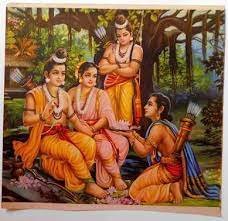When Sumantra conveyed the news to Dasaratha and Kausalya about Rama, Sita, and Lakshmana entering the forest, the king and his chief queen were left devastated. The weight of the situation bore heavily on them, and Kausalya couldn’t help but express her anguish, directing her frustration towards Dasaratha himself. She questioned how he could have been so cruel as to banish his own son, Rama, to the forest. These circumstances were recounted by Navalpakkam Vasudevachariar in a poignant discourse.
Amidst their distress, Kausalya’s thoughts turned to Sita, who was accustomed to a life of luxury and rich food in the palace. She wondered how Sita would fare in the harsh conditions of the forest, where sustenance was scarce. Concern for Rama’s well-being also occupied her mind, as she pondered whether he would receive his rightful place upon his return from exile. Kausalya couldn’t fathom how anyone, besides Kaikeyi and Bharata, could find happiness in the current state of affairs.
In the midst of this emotional turmoil, Sumitra, the third queen, remained composed and serene, as was her nature. Although her son Lakshmana had also left the kingdom to accompany Rama into exile, Sumitra did not succumb to her emotions. Even when the initial news of Rama’s departure for the forest was announced, it was Sumitra who provided solace and reassurance to Kausalya.
Sumitra’s unwavering calmness stemmed from her deep understanding of Lakshmana’s role in Rama’s life. She knew that Lakshmana, who was faultless and kind-hearted, existed to serve Rama to the best of his abilities. Thus, when Rama was destined for exile, it was only natural for Lakshmana, who was born to serve him, to join him in the forest.
In Sumitra’s mind, there was no doubt about the purpose and duty of Lakshmana. His unwavering loyalty and selflessness were evident as he willingly chose to accompany Rama into the depths of the wilderness. While Kausalya grappled with her emotions and Kausalya expressed her frustration, Sumitra remained steadfast, rooted in her belief that it was Lakshmana’s duty to serve and support Rama, regardless of the circumstances.
In the face of adversity, Sumitra’s unwavering faith in Rama’s righteousness and Lakshmana’s unwavering devotion brought her solace. She understood the profound bond that tied Rama and Lakshmana together and believed that their actions were guided by higher principles.
As the discourse unfolded, it became evident that while despair and turmoil engulfed the hearts of Dasaratha, Kausalya, and others affected by Rama’s exile, Sumitra stood as a pillar of strength and wisdom. Her serene demeanor and unwavering support for Lakshmana’s decision to accompany Rama were a testament to her profound understanding of duty, devotion, and the greater purpose that governed their lives.
In the trials that lay ahead, Sumitra would continue to embody strength and resilience, upholding her role as the mother of a noble and loyal son. Her unwavering faith in Rama and Lakshmana’s bond would serve as a beacon of hope and inspiration, not just for the people of Ayodhya but for all who encountered her unwavering devotion and calm demeanor.


